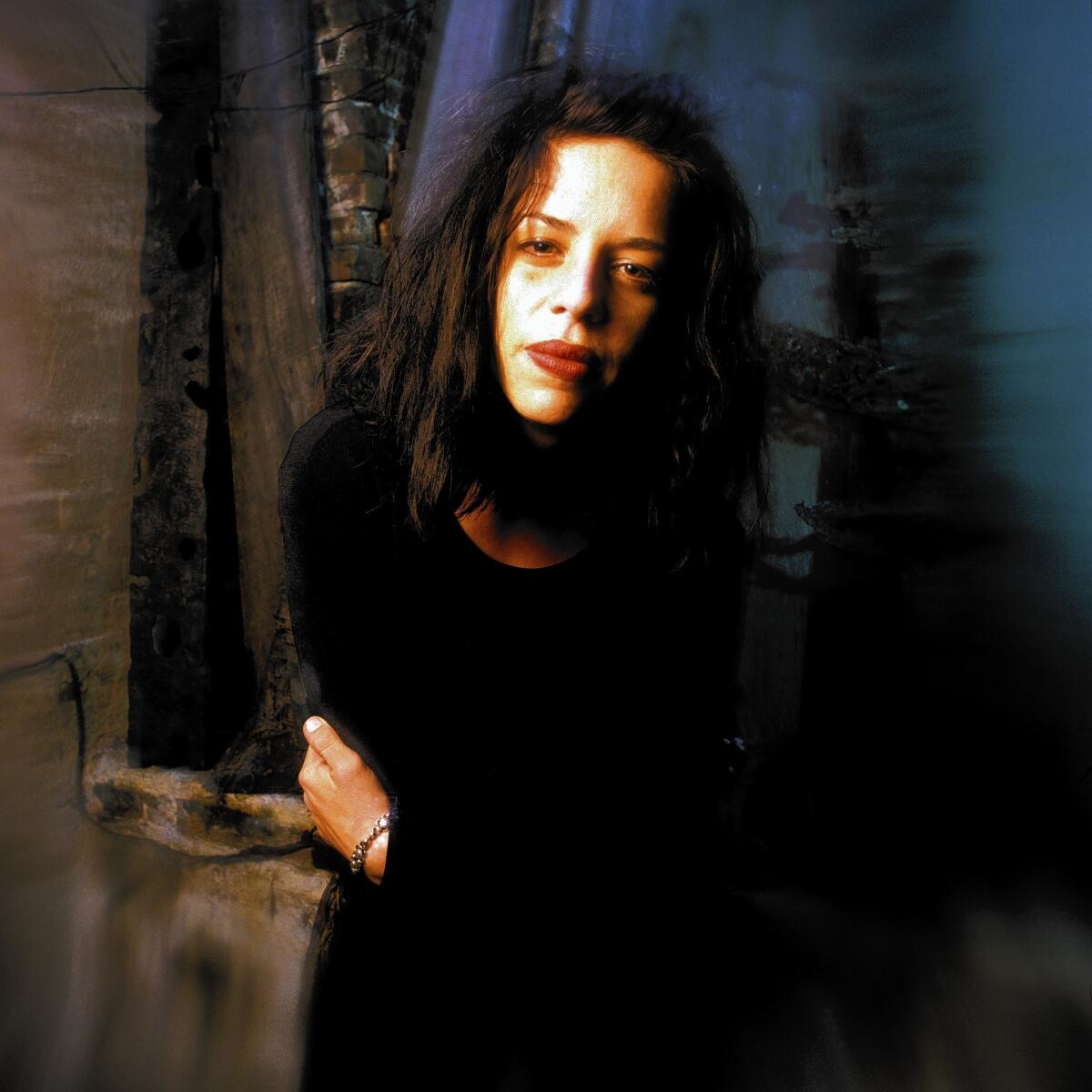Maggie Estep dies at 50; writer and spoken word artist

- Share via
With a strong push from MTV, spoken-word poetry went mainstream in the mid-1990s, and Maggie Estep was its leading lady.
Dressed in black, often backed by a rock band, Estep was a sassy, slightly twisted New Yorker who wrote and performed humorous, biting pieces that merged poetry with stand-up comedy. A regular at Manhattan’s Nuyorican Poets Café, the center of the poetry slam movement, she was a crowd favorite for pieces with titles like “Hey Baby” and “The Stupid Jerk I’m Obsessed With.”
“Maggie epitomized the potent early wave of slam poetry,” said Daniel Gallant, executive director of the Nuyorican Poets Café, where Estep performed before becoming an MTV star. “She helped shape this rebellious art form and infused it with musicality and punk sensibilities while paying homage to earlier generations of poetic pioneers.”
Estep, who turned to writing novels and essays after her career on stage, died Wednesday at a hospital in Albany, N.Y., two days after a heart attack, said her longtime friend, John Rauchenberger. She was 50.
She shot to pop-culture fame on MTV in 30-second spots that went into heavy rotation, then appeared on HBO’s “Def Poetry Jam” and at Woodstock ’94. She went on the road with Lollapalooza and MTV’s spoken-word tour alongside Henry Rollins and King Missile’s John S. Hall.
In her early work, Estep was a downtown New Yorker who talked tough, joked and was drawlingly sardonic while being sexually explicit. Her pieces often expressed the anger and frustrations of young, urban women. “I’m not a normal girl,” she said in one of her most popular “rants,” as she called her poems. “I’m an angry, sweaty girl, so bite me.”
She called her success a fluke.
“I was writing and someone dragged me to an open-mic situation,” she told the Los Angeles Times in 1994. “I was so scared. I was very introverted, very shy. I got so nervous, I’d just rush through things and just pace. It evolved into my signature.”
Margaret Estep was born on March 20, 1963, in Summit, N.J. Her mother and father were horse trainers and she had a peripatetic childhood, living in Maryland, France, Pennsylvania, Colorado and Canada. She attended high school in the affluent suburb of Scarsdale, N.Y., and dropped out at 17 to move to Manhattan.
Her first apartment was “a slanted-floor two-room hovel on Ludlow,” she wrote in the 2013 essay collection “Goodbye To All That: Writers on Loving and Leaving New York.”
“When the clubs closed, I’d walk home through a silence so deep I could hear packs of rats moving through garbage bags. Many of the buildings were vacant, holes in their sides where windows had been. Over a bricked-in window someone had spray-painted THINK OF THIS AS A WINDOW. When the end of the world came, this is what it would be like. And I’d be ready.”
Estep got tangled up in heroin, cleaned up and went to the Jack Kerouac School of Disembodied Poetics at Naropa University in Boulder, Colo., for two years. She later received a bachelor’s degree in literature from the State University of New York.
She was reading at open-mic events in coffee shops throughout the city when she emerged as one of the standout performers at the Nuyorican Café in the Lower East Side. It was there, in 1993, that scouts from MTV spotted her.
She released two spoken-word albums: “No More Mr. Nice Girl” in 1994 (NuYo/Imago), which included the semi-hit “Hey Baby,” and “Love is a Dog From Hell” (Mouth Almighty/Mercury) in 1997. That same year, she published the first of several novels, “Diary of an Emotional Idiot,” followed in 1999 by the short story collection “Soft Maniacs.”
She also wrote a trilogy of crime novels — “Hex” (2003), “Gargantuan” (2004) and “Flamethrower” (2006) — which revolve around a Coney Island museum staffer who becomes an unwilling detective drawn into the world of horse racing. Her last published book was the 2009 novel “Alice Fantastic.”
She was at work on the novel “The Angel Makers,” about gangster women, and a story collection, “The Story of Giants,” about people who protect animals, when she died.
In January she wrote on her website about the death of a friend. “My first reaction was total disbelief. He couldn’t possibly be dead. He wasn’t old. He was full of life.” Such was the response to her death, which was unexpected; according to her agent Alex Glass, Estep had no known heart problems.
A resident of Hudson, N.Y., Estep is survived by her mother, Nancy Murray; half-sister Ellen Murray; and twin half-brothers, Jon and Chris Murray.
More to Read
Start your day right
Sign up for Essential California for the L.A. Times biggest news, features and recommendations in your inbox six days a week.
You may occasionally receive promotional content from the Los Angeles Times.







